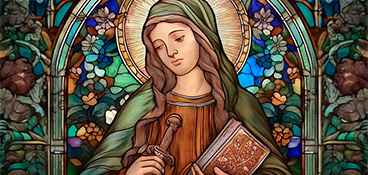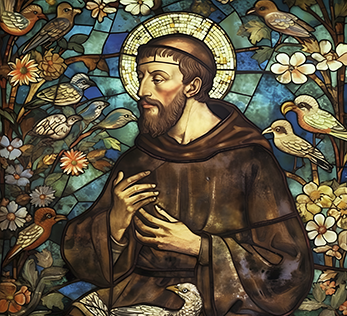St. Dymphna
St. Dymphna is the patron saint of persons living with mental illness and victims of domestic abuse
St. Dymphna’s feast day is May 15

Born in Ireland in the seventh century, Dymphna consecrated herself to Christ at age 14 and took a vow of chastity.
The story of St. Dymphna
St. Dymphna’s mother died when Dymphna was just 15. This precipitated a sharp decline in her father’s mental health. Encouraged by his advisors to remarry, he decided to marry his own daughter due to her resemblance to his deceased wife.
To avoid this and uphold her vows, Dymphna fled Ireland with her confessor, seeking safe haven in the small town of Gheel in Belgium. She was eventually discovered by her father, who killed both her and the priest when she still refused his advances. Dymphna and the priest were both buried in Gheel.
Miracles of St. Dymphna
Dymphna’s remains were later placed in a church in Gheel named in her honor. It still stands on the site where her body is believed to have first been buried.
Gheel is a place of pilgrimage for people seeking relief from all manner of nervous disorders through Dymphna’s intercession. The town itself can almost be considered a miracle of St. Dymphna, since thousands of people who suffer from mental illness either live there or are welcomed there and cared for by the townspeople.
Important dates for St. Dymphna
Dymphna was martyred at age 15 and canonized in 1247 following numerous miracles and healings attributed to her intercession that took place in Gheel. St. Dymphna’s Feast Day is celebrated on May 15.
How to pray to St. Dymphna
Almighty and loving Father,
By the example of St. Dymphna, virgin and martyr, and by her intercession, protect all those afflicted by tension and emotional stress, to enjoy your protection in life, and eternal happiness in your presence now and forever.
I ask this through Christ Our Lord.
Amen.
For daily inspiration from the Saints, follow our Facebook page.
Make an offering
with a prayer intention
to St. Dymphna
Born in Ireland in the seventh century, Dymphna consecrated herself to Christ at age 14 and took a vow of chastity.
The story of St. Dymphna
St. Dymphna’s mother died when Dymphna was just 15. This precipitated a sharp decline in her father’s mental health. Encouraged by his advisors to remarry, he decided to marry his own daughter due to her resemblance to his deceased wife.
To avoid this and uphold her vows, Dymphna fled Ireland with her confessor, seeking safe haven in the small town of Gheel in Belgium. She was eventually discovered by her father, who killed both her and the priest when she still refused his advances. Dymphna and the priest were both buried in Gheel.
Miracles of St. Dymphna
Dymphna’s remains were later placed in a church in Gheel named in her honor. It burned during the late 15th century and was rebuilt and consecrated in 1532. It still stands on the site where her body is believed to have first been buried.
Gheel is a place of pilgrimage for people seeking relief from all manner of nervous disorders through Dymphna’s intercession. The town itself can almost be considered a miracle of St. Dymphna, since thousands of people who suffer from mental illness either live there or are welcomed there and cared for by the townspeople.
Important dates for St. Dymphna
Dymphna was martyred at age 15 and canonized in 1247 following numerous miracles and healings attributed to her intercession that took place in Gheel. St. Dymphna’s Feast Day is celebrated on May 15.
How to pray to St. Dymphna
Almighty and loving Father,
By the example of St. Dymphna, virgin and martyr, and by her intercession, protect all those afflicted by tension and emotional stress, to enjoy your protection in life, and eternal happiness in your presence now and forever.
I ask this through Christ Our Lord.
Amen.
For daily inspiration from the Saints, follow our Facebook page.










